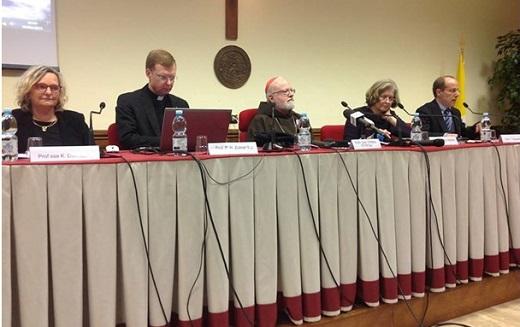The Centre for Child Protection, based at the Jesuit-run Pontifical Gregorian University in Rome, is at the forefront of the Catholic Church’s global response to prevent the sexual abuse of minors and vulnerable persons.
This pioneering venture offers assistance, particularly through education, to churches and religious and nongovernmental organisations, especially in Africa, Asia, and South America, to enable them to deal with and prevent abuse in their fields of responsibility. It also provides formation for priests and seminarians studying in Rome and courses for members of the Roman Curia and for new bishops.
Established as a pilot project in January 2012, through collaboration among the Gregorian University, the Archdiocese of Munich and Freising, and the Department of Child and Adolescent Psychiatry and Psychology of the State University Clinic of Ulm in Germany, the centre was originally based in Munich. Now, after three years successfully conducting an e-learning course that includes online training in awareness and prevention of sexual abuse of children and care for survivors, it has relocated to the Gregorian University, where the inauguration ceremony was held on February 16.
In a message for the occasion to Fr Hans Zollner SJ, a German Jesuit who is president of the centre, Pope Francis praised and encouraged the centre’s work.
Cardinal Seán O’Malley OFMCap, head of the Pontifical Council for the Protection of Minors, welcomed the outreach of the centre, which provides support for the work of his commission. “We are painfully aware of the many places in the world where the issue of clerical sexual abuse in the church has not been adequately addressed and we hope that the pontifical commission and the outstanding work of the centre will make a difference,” he said.
“We must render justice to the victims, but we must also do all we can to prevent abuse from happening,” Fr Zollner stated at the opening ceremony.
He said the centre draws on the expertise of psychologists, psychiatrists, social scientists, theologians, and canon lawyers. It provides “a platform for best practices” and “a structure of assistance based on the principles of subsidiarity”. The partners share responsibility for the project and contribute to the development of the program.
Since 2012 it has cooperated with partners in Argentina, Ghana, Germany, India, Indonesia, Kenya, New Zealand, Spain, and Uruguay, and some 1,000 persons have participated. But, Zollner said, it is vital to reach out more widely, “in a culturally sensitive way”, to churches and religious institutions where there is little awareness of the problem and few resources to address it.
The centre’s e-learning program was developed in the period 2012 to 2014 and is currently being revised in collaboration with Georgetown University to develop an interdisciplinary practical, interactive online course based on the Jesuit learning model of experience-reflection-action. The online qualification program sensitizes those who work with minors to the problem of sexual abuse and trains them to relate to victims/survivors of abuse.
In addition to all this, Baroness Sheila Hollins of the United Kingdom, chair of its scientific advisory board, said the centre is stepping up its research and teaching activities and envisages the creation of a network of academic institutions engaged in research concerning safeguarding minors.
As part of the Institute of Psychology, the centre is integrated into the Gregorian University’s academic structure and collaborates with its faculties of theology, canon law, and social sciences. It conducts interdisciplinary research and doctoral programmes. Its executive director, Professor Karlijn Demasure, a Belgian, announced that beginning in 2016 it will offer an annual one-semester diploma course on safeguarding of minors and vulnerable persons for students who want to work in this field. And Fr Zollner said he is discussing with the Dominicans and Salesians the possibility of cooperation with their Roman universities.
In these years, the Gregorian University has shown vision and courage by working at the frontline of the church’s global effort to prevent the sexual abuse of minors. After hosting the symposium “Toward Healing and Renewal” in February 2012, which was attended by representatives from 100 bishops’ conferences and 30 religious orders, it is now home to this important centre. [America Magazine]







